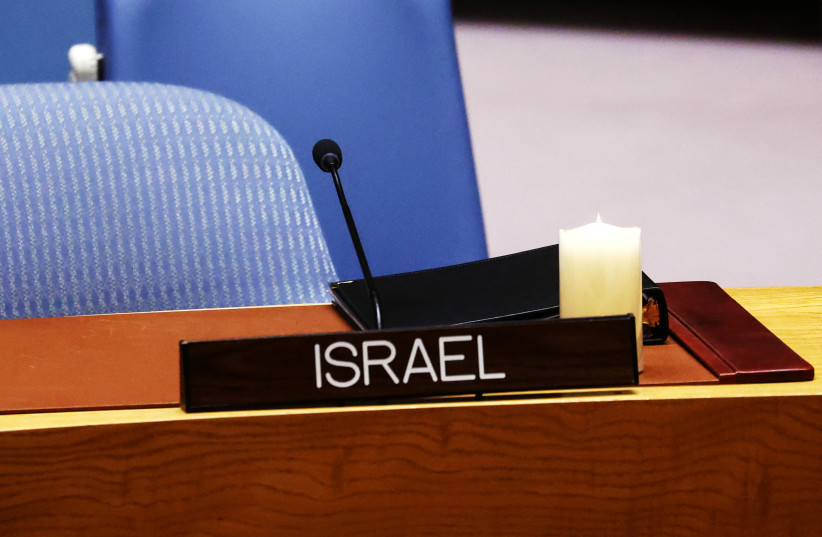The UN Human Rights Council’s Commission of Inquiry into Israel and the Palestinian Territory has demonstrated its incapacity to function as an independent tribunal based on the rule of law. Its incompetence was made clear during the recent presentation of the Commission’s third report.
At that presentation, one of the members of the Commission – Miloon Kothari – claimed that Ukraine and “Palestine” should be “dealt with” in the same way, namely, “international law uphold[s] correctly the rights of Ukrainians to resist and we would like to see the same standards being applied to the case in Israel and Palestine.”
This absurd claim is not only false, it is grossly misleading, by suggesting that Israel has somehow illegally attacked territory belonging to a State of Palestine.
According to Prof. Geoffrey Corn, a leading international expert on international humanitarian law (the law of war), “equating Ukraine’s international legal status in response to Russian aggression with that of the Palestinian Territory is a fundamental distortion of international law.”
Corn explains: “Since the adoption of the Charter of the United Nations, there have been few examples of a member State’s right – pursuant to Article 51 of the Charter – to act in self-defense, and the right of other member states to come to that victim state’s aid, than the situation Ukraine. Russia’s initial and most recent invasion of Ukrainian territory was a blatant violation of Article 2(4) of the Charter prohibiting the use of force against another member State.”

Ukraine and Palestine are not alike
Ukraine’s “resistance” is not only legally sanctioned by Article 51 but also deeply rooted principles of customary international law, which permits a state that is the victim of an armed attack to use all proportional means to protect and defend itself.
Nothing about the ongoing situation between Israel and the territories is even remotely analogous to this situation. First, Israel’s continuing presence in the territories is not the result of an unlawful armed attack against a Palestinian state.
Indeed, even the notion of such a state remains contested between the parties, both of which entered into an international agreement [the Oslo Accords – ed.] indicating that the final status of the territories must be decided through mutual subsequent agreement.
Second, even accepting the generally agreed position that Israel is bound by the international law of belligerent occupation in the territories as the result of gaining control through military action in 1967 (not against Palestine, but against Jordan), that law provides no “right” of self-defense analogous to Article 51.
At best, the law of belligerent occupation acknowledges that the occupying power will encounter resistance efforts within the occupied territory; and, when those resistance fighters operate on behalf of the state whose sovereign territory is under occupation, international law may accord such individuals prisoner of war status if captured.
But occupation law is fundamentally neutral on the issue of whether the occupying or occupied state was or was not acting as an aggressor or in self-defense; it is instead a legal regime triggered by the de facto reality of occupation.
Therefore, suggesting that Palestinians are vested with a “right” of resistance analogous to that of the Ukrainian people – a right ostensibly derived from the assumption that Palestine, like Ukraine, is the victim of an armed attack in violation of the Charter of the United Nations and is therefore exercising an inherent right of State self-defense – is factually untenable, historically distorted, and legally invalid.
In 2022, Kothari stated in an interview that Israel’s occupation has “been illegal from the beginning” adding, “I would go as far as to raise the question of why [Israel is] even a member of the United Nations. Because… the Israeli government does not respect its own obligations as a UN member state. They, in fact, consistently, either directly or through the United States, try to undermine UN mechanisms”.
Kothari is not a lawyer, and should not be placed in a position where he can misrepresent and misuse legal principles and mechanisms – without any possibility of review or appeal – to advance his own political agenda.
As UN Watch and other organizations have demonstrably shown, the Commission is fundamentally one-sided and members of the Commission are all heavily biased against Israel. But as Kothari’s recent statements show, the commission is not only biased, it is also incompetent.
It is time for UN member states to take their responsibility seriously and disband this dangerous body.
The writer is the director-general of The Hague Initiative for International Cooperation.
